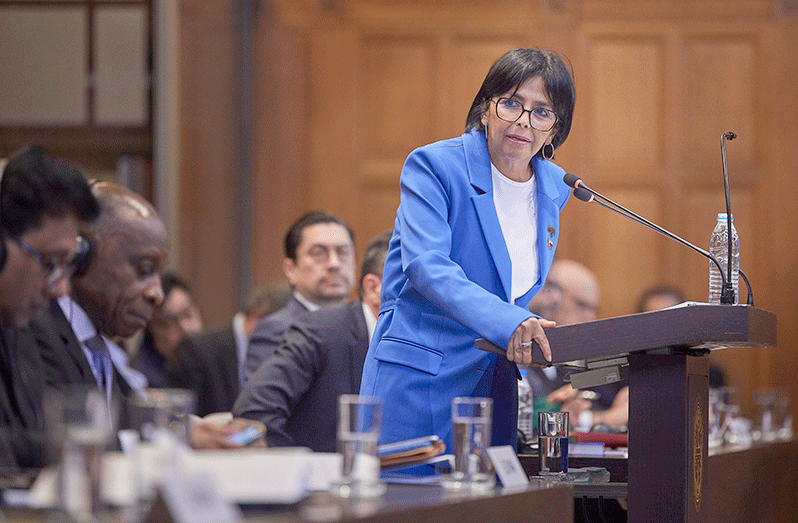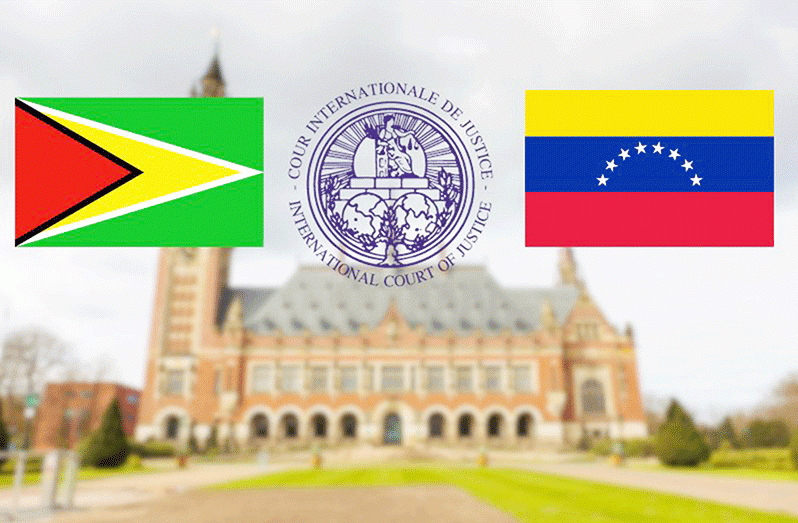THE International Court of Justice (ICJ) is expected to rule soon on Guyana’s request for provisional measures to prevent Venezuela from proceeding with its planned referendum on the unlawful territorial claim to the Essequibo region.
Guyana is also seeking from the court an order preventing Venezuela from taking any action to seize, acquire, encroach upon, or assert or exercise sovereignty over the Essequibo region or any other part of Guyana’s national territory, pending the court’s final determination of the validity of the 1899 Arbitral Award that established the land boundary between the two states and the final and binding nature of that boundary.
The court will announce a date for its decision on Guyana’s request to block the referendum.
During the second day of the hearing at the Peace Palace in The Hague, representatives of Venezuela addressed the court, and seemed to focus more on Guyana’s bilateral relationship with the United Nations, United States, and oil company, Exxon Mobil.
On Tuesday, Guyana’s representatives appealed for provisional measures to address the “imminent threat” occasioned by Venezuela’s upcoming referendum and called for the ICJ to act now to prevent “incalculable and irreparable injury” to Guyana’s rights.
Renowned international legal counsel Paul Reichler explained during his submissions that the referendum, as outlined by President Nicolas Maduro, aims to solidify Venezuela’s rejection of the 1899 Arbitral Award.

Additionally, it also challenges the ICJ’s jurisdiction in a move that could have profound consequences on the ongoing territorial controversy between the two nations.
As such, Reichler stressed the urgency of seeking the court’s assistance to prevent “incalculable and irreparable injury” to Guyana’s rights, particularly concerning the Essequibo region.
The territory, awarded to British Guiana in the 1899 Arbitral Award, is now at the centre of a revived territorial claim by Venezuela.
According to Reichler, the impending referendum is not merely a gauge of public opinion but a strategic move by the Spanish-speaking nation to gain popular support for decisions that have already been made at the highest levels of its government.
However, on Wednesday, Venezuela’s Vice President, Delcy Rodriguez, in defiance, began by emphasising that Venezuela’s participation in the hearing should not be misconstrued as recognition of the ICJ’s jurisdiction over the territorial controversy concerning “Guayana Esequiba”.
“I wish to begin by emphasising that our participation in this hearing in no way implies recognition of the jurisdiction of this honourable court over the territorial dispute concerning Guayana Esequiba…” she said.
She argued that the attempt to prevent the consultative referendum scheduled for December 3 was a violation of the United Nations Charter and the ICJ’s statute.
“Following the attempt to dispossess our nation of its territory by the fraud perpetrated by the Paris tribunal in 1899, Venezuela adopted a doctrine of not submitting the settlement of disputes relating to its vital interests to the decision of third parties,” Rodriguez stated.
The proceedings took an interesting turn when Rodriguez played an eight-minute excerpt from President Dr. Irfaan Ali’s recent address at the launch of the Essequibo Chamber of Commerce and Industry’s annual Agro and Trade Expo.
Rodriguez sought to emphasise President Ali’s commitment to not ceding any territory to Venezuela, framing it within the context of the ongoing territorial dispute.
However, Rodriguez’s selective quoting potentially distorts President Ali’s original message, which highlighted the government’s commitment to representing the people of Essequibo amid the border controversy.
President Ali had reaffirmed a dedication to peace, defending every square inch of Guyana, and updating the regions on economic prospects and development initiatives in Essequibo.
“That was the president of Guyana speaking… saying that he wasn’t going to give an inch of its territory to Venezuela. When this, of course, is the territory in dispute,” Rodriguez said to the court.
Rodriguez had spurned Guyana’s actions, characterising them as an audacious maneuver to leverage the court against Venezuela.
In his submissions on Tuesday, Reichler had drawn attention to Venezuela’s military preparations, including the construction of a military airfield near the international boundary, and Reichler underscored the urgency of the situation.
He warned that the impending annexation of Guyana’s territory by Venezuela, coupled with its rejection of the court’s jurisdiction, could result in irreparable damage to Guyana’s rights.
“As the court has explained on various occasions, the condition of urgency is met when the acts susceptible of causing irreparable prejudice can occur at any moment before the court makes a final decision on the case,” he said.
Reichler told the ICJ Guyana has taken no actions that would disrespect the court or prejudice Venezuela’s claims.
Reichler had painted a stark picture of the immediate threat, emphasising that Venezuela’s actions were far from mere rhetoric.
The Venezuelan official claimed that Guyana has devised a false desire to present itself as a defenseless sheep and to portray Venezuela as an aggressive state, despite the glaring evidence of their army setting up at the border.
Rodriquez, in reply to Reichler’s claims, argued that Guyana’s move was a clear case of judicial colonialism, emphasising Venezuela’s historic position outlined in the 1966 Geneva Agreement, which did not recognise the judicial route for dispute resolution.
Rodriguez argued that the 1899 arbitral award was “fallacious” since Venezuela had “alienable” rights to the territory of Guyana it claims.
She also contended that Venezuela was a victim of the “British empire” and was the sole “legitimate” owner of the land.
In 1897, Venezuela and Great Britain concluded an agreement — the Treaty of Washington — by which they agreed to submit the dispute regarding the location of their land boundary to binding arbitration before a tribunal of eminent jurists, including the heads of the judiciary of the United States and Great Britain.
The parties — Britain and Venezuela — agreed in that Treaty to accept the Tribunal’s Award as a full, perfect and final settlement of the boundary issue between the parties.
Now, in her submissions to the court, Rodriquez sought to portray the process, which culminated in the 1899 Award, as a corrupt and unjust stitch-up designed to rob Venezuela of its precious territory and resources.
Guyana had previously abridged that this contention lacked much merit and urged the court to look at the evidentiary record, which showed that Venezuela enthusiastically engaged in the arbitration and even praised the competence and independence of the arbitral tribunal.
Responding to Guyana’s accusations, Rodriguez disputed the claims that Venezuela was threatening regional stability.
She accused Guyana of preparing for a military attack against Venezuela with the support of the United States.
The United States had previously denied that it had plans to set up a military base in Guyana. Guyana’s government has made no request to establish a military base in Guyana.
However, Rodrigues provided no evidence of this.
Rodriguez also accused Guyana of promoting xenophobia during her address at the ICJ.
She claimed that Guyana was directing actions against the Venezuelan population living on its territory, violating international obligations in terms of human rights, and fostering unacceptable xenophobia.
Rodriguez argued that Guyana’s actions were fuelled by its support for multinational oil companies, specifically highlighting the involvement of ExxonMobil.
Again, no evidence was provided about these claims.
Contrary to Venezuela’s claims, Guyana’s government has consistently maintained a stance against xenophobia. Officials have emphasised the importance of treating migrants, including those fleeing Venezuela due to the ongoing tensions in their homeland, with empathy and dignity.
The government’s condemnation of inhumane treatment underscores its commitment to fostering an environment that upholds human rights.
Guyana’s efforts to protect and provide for migrants have been rooted in humanitarian principles, emphasising the need to address the health and socio-economic concerns of vulnerable groups, such as the Warrau indigenous community.
Guyana’s government has demonstrated a proactive approach to assisting migrants from Venezuela, numbering approximately 40,000.
The nation has undertaken substantial efforts to protect these vulnerable populations and provide them with necessities such as access to health and education services.
The open-door policy has not only facilitated the entry of those seeking refuge but also emphasised the importance of integration. By regularising the status of migrants, Guyana seeks to ensure that individuals are not only granted sanctuary but are also given the opportunity to contribute positively to their new communities.
The government’s condemnation of any inhumane treatment of Venezuelans within its borders underscores its commitment to upholding human rights principles. Additionally, Guyana has taken steps to ensure that migrants receive life-saving medical care and free public health services, acknowledging the fundamental right to health and well-being.
Recent developments have heightened the geopolitical situation, as Venezuela, through its National Electoral Council, unveiled plans for a “Consultative Referendum” on December 3, 2023.
Guyana contends that this move is a thinly veiled attempt by Venezuela to gather support for abandoning the ongoing ICJ proceedings, and unilaterally assert control over the Essequibo region.
In response, Guyana swiftly approached the ICJ, seeking urgent provisional measures to prevent any actions by Venezuela that could jeopardise the status quo until the court reaches a final verdict on the matter.
Earlier this year, the ICJ had ruled that it has jurisdiction to hear Guyana’s substantive case, which is still before the court.












